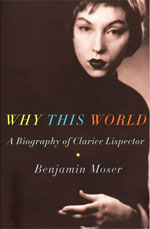Read
A pathetic episode has occurred at the Frankfurt Book Fair, in which fair organizers bowed to the Chinese government by disinviting some dissident Chinese writers. Then they said sorry and invited them back, then the Chinese delegation walked out of a symposium, then they came back when Juergen Boos, the fair organizer, apologized. It’s a big mess and reflects poorly on the event’s organizers, who claim to be defenders of free speech. (After all, we already knew that the Chinese government, the supposed guest of honor this year, can’t tolerate dissent.) M.A. Orthofer sums up the situation here and here. The fair itself starts in mid-October.
 Harper’s editor Benjamin Moser’s biography of Clarice Lispector (Why This World) has been getting some good notices. Oxford University Press threw a party for him at their offices in New York. Moser seems like quite a polymath—he knows ten languages, six fluently—and in his judgment, Lispector is the “most important Jewish writer since Kafka.”. (And, as you’ll find in nearly every review of the book, she was hot. Enough of that already.)
Harper’s editor Benjamin Moser’s biography of Clarice Lispector (Why This World) has been getting some good notices. Oxford University Press threw a party for him at their offices in New York. Moser seems like quite a polymath—he knows ten languages, six fluently—and in his judgment, Lispector is the “most important Jewish writer since Kafka.”. (And, as you’ll find in nearly every review of the book, she was hot. Enough of that already.)
The Israeli film Lebanon, which Haaretz describes as an anti-war movie, won the Golden Lion, the highest award at the Venice Film Festival. Most of the movie’s action takes place inside an Israeli tank during the 1982 invasion of Lebanon. A Hebrew-language trailer is available on YouTube and is worth watching for the remarkable shots from within the cloistered tank. For other excellent Israeli movies on Lebanon, check out Waltz with Bashir and the lesser-known Beaufort (which can be viewed on Netflix’s website).
Another redesigned online pub: this time it’s the Barnes & Noble Review. Read the editor’s note about the redesign, and then check out some of the new content, like Daniel Menaker’s extensive survey of the publishing industry or Chris Barsanti’s brief review of The Complete Stories of J.G. Ballard (which runs more than 1,200 pages).
It’s funny watching neocons flail around trying to figure out why most Jews are liberals, à la Norman Podhoretz’s Why Are Jews Liberal? According to Jonah Goldberg, it’s “arrogance.”
At NPR, John Powers examines a documentary and a novel about private lives lived publicly.
Listen
On KCRW’s “Politics of Culture,” Kevin Roderick, the man behind LA Observed, talks with John Buntin and Richard Rayner about crime, corruption, and politics in Los Angeles in the 1920s and 30s. Buntin is the author of L.A. Noir: The Struggle for the Soul of America’s Most Seductive City and Rayner wrote A Bright and Guilty Place: Murder, Corruption and L.A.’s Scandalous Coming of Age.
There’s a lot of coverage of the Brooklyn Book Festival. On Leonard Lopate’s show, he talks with the borough’s president and the chair of the Brooklyn Literary Council.
Watch
The London Review Bookshop website has a batch of videos from World Literature Weekend, which took place July 19-21. Take in a discussion on translation, which offers some good insights into the process.
There’s another another Electric Literature animation, this one a depiction of a Michael Cunningham sentence by animator Jonathan Ashley.






